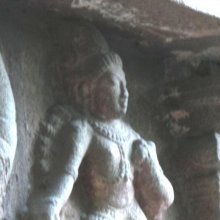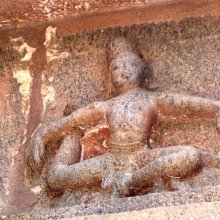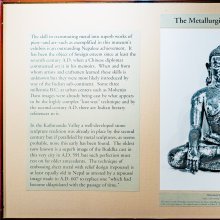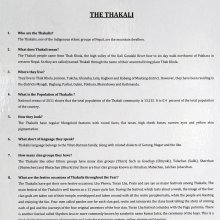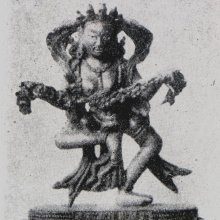Nid: 9 definitions
Introduction:
Nid means something in Hinduism, Sanskrit. If you want to know the exact meaning, history, etymology or English translation of this term then check out the descriptions on this page. Add your comment or reference to a book if you want to contribute to this summary article.
Images (photo gallery)
(+8 more images available)
Languages of India and abroad
Sanskrit dictionary
Source: DDSA: The practical Sanskrit-English dictionaryNid (निद्).—1 U. (nedati-te)
1) To be near.
2) To blame, censure, approach; cf. निन्द् (nind).
--- OR ---
Nid (निद्).—f. Ved. Mocking, despising, censuring.
Source: Cologne Digital Sanskrit Dictionaries: Shabda-Sagara Sanskrit-English DictionaryNid (निद्).—[(i) nidi] r. 1st cl. (nindati) To reproach, to blame.
Source: Cologne Digital Sanskrit Dictionaries: Benfey Sanskrit-English DictionaryNid (निद्).— i. 1, [Parasmaipada.] [Ātmanepada.] (only ved. and very seldom), and nind Nind (perhaps originally vb. nad with the prep. ni), i. 1, [Parasmaipada.] (in epic poetry also [Ātmanepada.], Mahābhārata 7, 2601), To blame, Mahābhārata 2, 2275. nindita 1. Reprehended, [Mānavadharmaśāstra] 3, 47. 2. Reprehensible, 42. 3. Despised, 3, 165. 4. Forbidden, 11, 44. 5. Inauspicious, 182. Comp. A- adj. blameless, [Mānavadharmaśāstra] 3, 42. nindya 1. reprehensible, [Mānavadharmaśāstra] 3, 42. 2. forbidden, 3, 50. 3. disgraceful, 11, 53. Comp. 1. A-nindya adj. blameless, [Mānavadharmaśāstra] 3, 42. 2. A-nedya adj. blameless,
— With the prep. pari pari To blame violently, Mahābhārata 5, 40.
— With prati prati To blame, 3, 15656.
— With vi vi To blame, 3, 13700.
— Cf. etc., etc.; [Gothic.] ga-naitjan, naiteins; [Old High German.] neizjan; [Anglo-Saxon.] naetan, naeting; probably also [Gothic.] neith, A. S. nidh, ge-nidhle (hatred).
--- OR ---
Nid (निद्).— i. 1, [Parasmaipada.] [Ātmanepada.] To be near.
Source: Cologne Digital Sanskrit Dictionaries: Cappeller Sanskrit-English DictionaryNid (निद्).—1. nind, nindati (nindate), [participle] nindita (q.v.) revile, abuse, blame, despise; ridicule, mock, surpass. [Desiderative] ninitsati be willing to revile.
--- OR ---
Nid (निद्).—2. [feminine] mocking, contempt; mocker, blamer, reviler; adj. mocking, reviling (—°).
Source: Cologne Digital Sanskrit Dictionaries: Monier-Williams Sanskrit-English Dictionary1) Nid (निद्):—1. nid See √nind and √2. ned.
2) 2. nid f. mocking, ridiculing, contempt
3) mocker, scoffer, blamer, enemy, [Ṛg-veda]
Source: Cologne Digital Sanskrit Dictionaries: Yates Sanskrit-English Dictionary1) Ṇid (णिद्):—(i) nindati 1. a. To abuse, to revile. (ṛ) nedati, te 1. c. Idem.
2) Nid (निद्):—(i) nindati 1. a. To reproach.
[Sanskrit to German]
Sanskrit, also spelled संस्कृतम् (saṃskṛtam), is an ancient language of India commonly seen as the grandmother of the Indo-European language family (even English!). Closely allied with Prakrit and Pali, Sanskrit is more exhaustive in both grammar and terms and has the most extensive collection of literature in the world, greatly surpassing its sister-languages Greek and Latin.
Nepali dictionary
Source: unoes: Nepali-English DictionaryNid is another spelling for नीड [nīḍa].—n. 1. shelter; den; 2. nest;
Nepali is the primary language of the Nepalese people counting almost 20 million native speakers. The country of Nepal is situated in the Himalaya mountain range to the north of India.
See also (Relevant definitions)
Starts with (+601): Nida, Nidaaune-jhaar, Nidadru, Nidadu, Nidagarbha, Nidagha, Nidaghadhaman, Nidaghakala, Nidaghakara, Nidagharuci, Nidaghasindhu, Nidaghavadhi, Nidaghavarshika, Nidah, Nidaha, Nidaha, Nidaha, Nidahaka, Nidahati, Nidahi.
Ends with: Bhinid, Chirumanid, Devanid, Neravunidu, Pratinid, Samanid, Tvanid, Vinid.
Full-text (+1213): Nind, Prayojana, Tvanid, Devanid, Apekshi, Apeksha, Ninda, Jarurata, Avashyakata, Darakara, Yugantabandhu, Mahaga, Avashyakta, Vyasanakala, Hajata, Manicara, Nindana, Nirvinna, Hajat, Vininda.
Relevant text
Search found 497 books and stories containing Nid, Ṇid, Need; (plurals include: Nids, Ṇids, Needs). You can also click to the full overview containing English textual excerpts. Below are direct links for the most relevant articles:
Heimskringla (by Snorri Sturlson)
Part 62 - King Harald's Challenge < [Chapter IX - Saga Of Harald Hardrade]
Part 40 - Earl Svein's And Einar's Consultations < [Chapter VII - Saga Of Olaf Haraldson]
Part 3 - Magnus Made King < [Chapter VIII - Saga Of Magnus The Good]
Blue Annals (deb-ther sngon-po) (by George N. Roerich)
Chapter 1 - Secret Mantra In Jambudvīpa < [Book 10 - The Kālacakra]
Chapter 5 - Cakrasaṃvara < [Book 7 - The preaching of the Tantras]
Taliesin (by David William Nash)
Chapter III - The Historical Poems
Chapter IV - The Mythological Poems
The Tattvasangraha [with commentary] (by Ganganatha Jha)
Verse 2926 < [Chapter 25 - Examination of the Doctrine of ‘Self-sufficient Validity’]
Verse 2012-2013 < [Chapter 23 - External World]
Verse 2374 < [Chapter 24b - Arguments against the reliability of the Veda (the Revealed Word)]
Language Policy for India < [April 1962]
Dragon (D.R.A.G......O.N) < [October – December, 2007]
My Bird Flew Away < [January – March, 1993]
Taittiriya Upanishad Bhashya Vartika (by R. Balasubramanian)
Verse 2.14 < [Book 2 - Brahmavallī]
Verse 2.742 < [Book 2 - Brahmavallī]
Verse 2.608 < [Book 2 - Brahmavallī]
Related products
(+79 more products available)
